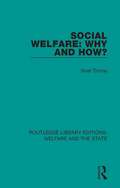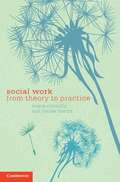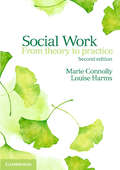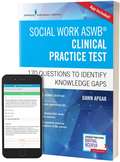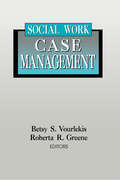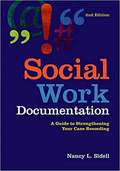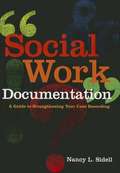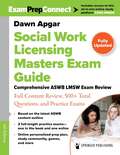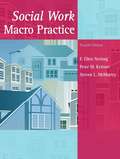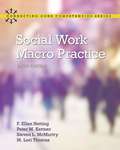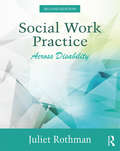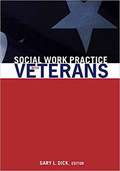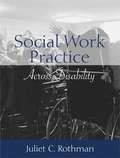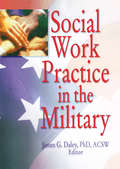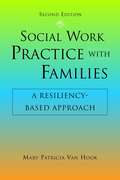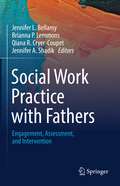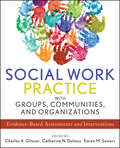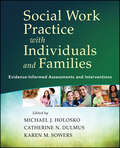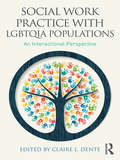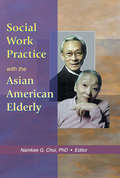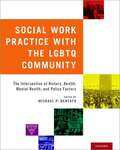- Table View
- List View
Social Welfare: A History Of The American Response To Need
by June Axinn Mark SternSocial Welfare: A History of the American Response to Need enables students to place current issues of social concern in their historical contexts. It examines the comprehensive history of social welfare from the 18th century to the present, while exploring the ideas―as well as the economic and political forces―that have shaped policy development. Using numerous original documents to provide a clearer picture of historical periods, the authors show how social conditions, ideas about dependency and poverty, and institutions have shaped social policy and the efforts of voluntary organizations and individuals who work with at-risk populations. This book is part of the Connecting Core Competencies Series, which helps students understand and master CSWE’s core competencies with a variety of learning aids that highlight competency content and critical-thinking questions for the competencies.
Social Welfare: Politics And Public Policy
by Diana M. Dinitto David H. JohnsonAcknowledged as the most comprehensive, easy-to-read introduction to social welfare policy available, Social Welfare: Politics and Public Policy, 8/e, emphasizes the current political aspects of policy making and major social welfare programs, including public assistance, Social Security, disability, health insurance, child welfare, and much more. Social Welfare does more than describe the major social welfare policies and programs; it also tackles the conflict and controversies involved in the processes and outcomes of policy making. It contrasts rational and political approaches to policy making, policy analysis, policy implementation, and policy evaluation. The authors present conflicting perspectives, encouraging students to think critically, to debate, and to consider their own views on issues.
Social Welfare: Scottish Perspective (Routledge Revivals)
by Mono ChakrabartiThis title was first published in 2001. This volume, adopting a Scottish perspective, concentrates on welfare issues in the UK. The book acknowledges the fact that the Scottish legislative base has, historically, been different from the rest of the country, and explores the impact of these differences upon the nature of welfare institutions and service provision. The contributors also critically investigate the important changes being implemented in Scotland within the disaggregated local authority structure, exposing the resource implications for service providers. The book tackles policy issues ranging from poverty and social security to health care, education and criminal justice. An analysis of the relevant laws is incorporated into every chapter, together with an investigation of the crucial implications of social and welfare policies for family structure, class and ethnicity.
Social Welfare: Why and How? (Routledge Library Editions: Welfare and the State #21)
by Noel W TimmsOriginally published in 1980, Social Welfare: Why and How? is a collection of papers contributing to the subject of welfare philosophy, and to philosophising about and doing welfare. It advances emerging arguments concerning the growth grounds and uses of social welfare. The book is divided into two main sections, the first looks at the growth and the grounds of social welfare and the second looks at the practice of social welfare. The collection of papers provides a multi-disciplinary look at the subject through the lens of philosophy, social policy, social work and economics.
Social Work
by Marie Connolly Louise HarmsSocial workers practice across a wide range of settings with many different people. Some work primarily with individuals, some work with families or groups of people in therapeutic or community contexts, while others focus on community advocacy, community action and social change. In such diverse disciplinary contexts, the notion of theoretically informed practice can seem complicated. Written as a core text, the book captures the critical information students need to feel confident in the application of theory to practice. Integrated case studies from both Australasian and international perspectives illustrate how theory works in practice and how theory facilitates change. Social Work Theory and Practice provides a comprehensive exploration of knowledge in practice, the use of evidence as a basis for practice, and the ways in which theory helps practitioners to understand, make sense of, and respond to complex human needs.
Social Work
by Marie Connolly Louise HarmsThis wide-ranging collection of essays offers valuable insights into the cultural issues involved in the practical application of social work theories. Leading contributors explore the challenges faced by indigenous populations and ethnic minority groups, examining how they can gain control over their position as minority populations, and offering valuable guidance on cross-cultural work. The direct implementation of four established theoretical approaches - ecological systems, community development, strengths-based approaches and attachment theories - is shown in a variety of contexts, including mental health care, trauma counselling and child protection. Using community development work in Australia and New Zealand as a case study, the contributors also advocate using these approaches in work with migrants and refugees. Social Work Theories in Action recognizes the importance of drawing on the strengths of families, individuals and communities and offers theoretical perspectives that can be applied in everyday work situations. It is essential reading for social and community workers, mental health professionals and social work students.
Social Work ASWB® Clinical Exam Guide: A Comprehensive Study Guide for Success (Second Edition)
by Association of Social Work BoardsStudents and social workers preparing for the social work clinical licensure exam will find an invaluable study resource in the Social Work ASWB® Clinical Exam Guide. Written by a prominent social work leader and trainer for social work licensing exams in the United States, this guide is based on years of time-tested exam prep workshops conducted by the author. It mirrors the ASWB Clinical “Knowledge, Skills, and Abilities” upon which the exam is based and incorporates information from the DSM®-5. The guide is comprehensive yet focuses on the material most likely to be included on the exam, so readers can prioritize information as they study. A self-assessment section helps identify strengths and weaknesses before tackling the material. The author shares her extensive knowledge of the exam by providing useful test-taking strategies and tips for overcoming test anxiety. The 170-question practice test at the end of the guide (with explanations of the correct answers) mirrors the actual exam in both length and structure. Content includes human development, human behavior in the environment, diversity, addictions, assessment and diagnosis, treatment planning, clinical interventions, case management, and professional values and ethics. This book will be a valuable asset for social workers throughout the United States and Canada.
Social Work Aswb Clinical Practice Test: 170 Questions To Identify Knowledge Gaps
by Dawn ApgarWritten by a highly respected social work educator rather than an unknown at a test preparation company, this full-length practice test with answers and rationales covers all the content areas of the updated ASWB(R) Clinical Exam. A valuable diagnostic tool to improve test success, the 170 questions mirror the exam in length, structure, and content. Reviewers applaud the book's test-taking strategies for each question, which are based on the author's extensive knowledge of the exam. In-depth rationales for correctly answering each question help readers identify gaps in knowledge and errors in problem solving. Additional test-taking tips make this book an invaluable resource for those who want to pass the ASWB(R) Clinical Exam on the first attempt
Social Work Case Management
by Roberta R. Greene Betsy S. VourlekisThis new practice text provides a series of readings focusing on case management in a number of fields and in a variety of settings with different client populations. Each chapter examines a major component of case management practice by presenting information about an innovative program from a different location around the country. In conjunction, these readings provide a road map to social work case management.In addition to offering up-to-date practice approaches and examining the functions and skills of case management in depth, the authors provide the policy information needed for putting this traditional form of social work practice into today's service delivery context.
Social Work Documentation: A Guide To Strengthening Your Case Recording
by Nancy SidellThe second edition of Social Work Documentation: A Guide to Strengthening Your Case Recording is an update to Nancy L. Sidell's 2011 book on the importance of developing effective social work documentation skills. The new edition aims to help practitioners build writing skills in a variety of settings. New materials include updates on current practice issues such as electronic case recording and trauma-informed documentation. The book addresses the need for learning to keep effective documentation with new exercises and provides tips for assessing and documenting client cultural differences of relevance. Sidell encourages individuals to reflect on personal strengths and challenges related to documentation skills. Social Work Documentation is a how-to guide for social work students and practitioners interested in good record keeping and improving their documentation skills.
Social Work Documentation: A Guide to Strengthening Your Case Recording
by Nancy L. SidellIn Social Work Documentation: A Guide to Strengthening Your Case Recording, Nancy Sidell has written the perfect, practical, how-to book on developing effective documentation. Regardless of the practice setting, clinical specialty, and documentation format, this book will help to build better recording skills.
Social Work Licensing Masters Exam Guide: Comprehensive Aswb Lmsw Exam Review With Full Content Review, 500+ Total Questions, And Practice Exams
by Dawn ApgarSocial Work Licensing Masters Exam Guide, Fourth Edition, provides everything you need to successfully pass the ASWB LMSW exam and become fully licensed to practice. This bestselling guide from Dawn Apgar is now updated with more practice questions and features to help you study for and pass the LMSW exam. Chapters fully cover the four exam content areas and all Knowledge, Skills, and Abilities (KSAs), and end-of-section questions test your understanding and retention. The review concludes with 2 full-length practice exams to prepare you for exam day. With more than 500 unique questions, detailed review content, answer rationales, a glossary of key social work terms, and access to ExamPrepConnect, this guide empowers you with the tools and materials to study your way and the confidence to pass the first time, guaranteed (details inside). Join thousands of successful licensed social workers who have passed their exam with this essential resource.
Social Work Macro Practice
by Peter M. Kettner F. Ellen Netting Steve McmurtryThis undergraduate textbook challenges social workers accustomed to working with individuals and families to expand their efforts at generating change at the community and organizational level. The third edition adds a final chapter on strategies for implementing a planned change intervention. Annotation (c)2003 Book News, Inc., Portland, OR (booknews.com)
Social Work Macro Practice (Connecting Core Competencies)
by Peter M. Kettner F. Ellen Netting M. Lori Thomas Steven L. McMurtryThis book approaches the field of social work recognising that all social workers must be able to engage, assess, and intervene with individuals, families, groups, organisations, and communities. It focuses on enabling social work practitioners to undertake whatever types of macro-level interventions are needed in an informed, analytical manner, confident that they can do a competent job and achieve positive results.
Social Work Practice Across Disability
by Juliet RothmanThis book will help prepare the reader to work across disabilities by providing knowledge and training grounded within the ecological framework in four principal areas. The four principal areas reader will be trained in are: the societal environment and disability; disability and the individual experience; essential skills for social work micro, mezzo, and macro practice with people with disabilities; and the resource and support network for persons with disabilities. The book is organized around four units, each of which addresses one of the areas noted. It is not the purpose of this book to enable the reader to gain expertise in any one disabling condition or impairment. Rather, the goal is to provide a broad base of knowledge and skills, which will enable the reader to work effectively across a variety of disabling conditions. Special educators, social workers,parents
Social Work Practice With Veterans
by Gary L. DickIn times of crisis, service members answer the call of duty, making the ultimate sacrifice for their country. When our military service members are called to defend our nation, the entire family system is affected. The families of deployed service members are also called on to serve and sacrifice for their country as they continually accept, adapt, and adjust to the changes that accompany the various stages of the deployment cycle. Social Work Practice with Veterans is a comprehensive, evidence-based social work book that addresses the multiple issues related to working with service members, veterans, and their families. Service members who return from deployment often face a multitude of physical and mental health issues as they reintegrate back into family life. Social workers serving military service members and veterans need to be competent and knowledgeable about the military culture and informed about the best practices. Social Work Practice with Veterans incorporates all of the 10 Council on Social Work Education Core Competencies and is divided into three major sections. The book integrates research, practice experience, case studies, theory, and social work values into a single text that covers the entire cycle of deployment and the complicated adjustments associated with posttraumatic stress disorder, suicide, traumatic brain injury, and substance abuse, with special chapters devoted to military fathers, gays in the military, military children, and more. Social Work Practice with Veterans is an excellent resource for social workers, counselors, and mental health professionals who work with the military community.
Social Work Practice across Disability
by Juliet C. RothmanThis book will help prepare the reader to work across disabilities by providing knowledge and training grounded within the ecological framework in four principal areas. The four principal areas reader will be trained in are: the societal environment and disability; disability and the individual experience; essential skills for social work micro, mezzo, and macro practice with people with disabilities; and the resource and support network for persons with disabilities. The book is organized around four units, each of which addresses one of the areas noted. It is not the purpose of this book to enable the reader to gain expertise in any one disabling condition or impairment. Rather, the goal is to provide a broad base of knowledge and skills, which will enable the reader to work effectively across a variety of disabling conditions.
Social Work Practice in the Military
by Carlton Munson James G DaleySocial Work Practice in the Military provides military social workers, military scholars, and civilian social workers with an overview of diverse practice settings as well as the history and future of military social work practice to give you an understanding of the military persona as an ethnic identity. This unique book provides in-depth coverage of issues such as family violence, substance abuse, medical social work, combat settings, ethical dilemmas, managed care's impact on the military, and much more. Social Work Practice in the Military is an essential guide for anyone working with military clients, families of military personnel, or near a military installation. This valuable book contains input from top current and past leaders within the ranks of military social workers to bring you a wide spectrum of firsthand ideas and input to help you better assist your military clients.Social Work Practice in the Military will help you better understand the diversity of social work practice within the military and the many unique situations a military social worker must face. This informative book will provide you with specific ways of improving the lives of your military clients and their families, such as: understanding how the most rapidly expanding arena of practice, family advocacy, which includes a broad array of family violence prevention and intervention services, can help military clients learning how TRICARE, the military managed health care program, impacts military families and social workers in order to provide your clients with the best care while working within the limited budget of a managed care program analyzing the historical discussions of the changing view of substance abuse treatment within the military and how you can best provide effective, multilevel services to your clients examining the extensive involvement of military social workers in a myriad of medical social work programs serving patients and families to help you offer the best patient care in situations involving domestic violence and drug abuse discovering essential skills for military social workers, such as, effective involvement in combat or deployed situations Through Social Work Practice in the Military, you will better understand the importance of your many roles as clinician, advocate, policymaker, resource liaison, and organizational consultant and learn how to successfully accomplish every one of these roles. Containing insight into the future directions of practice, this valuable book will help you effectively assist military clients and their families with the various challenges they face.
Social Work Practice with Families: A Resiliency-Based Approach
by Mary Patricia Van Hook<p>Social Work Practice with Families is a useful guide to family therapy with a strengths-based perspective that focuses on families vitality and capacity to thrive. The book explores resiliency as an empirically grounded framework with which to conduct assessments with families effectively. Van Hook presents a thorough discussion of contemporary treatment models, clearly demonstrating the importance of selecting appropriate treatments based on the specifics of each assessment. Using extensive case materials drawn from both the United States and Canada, this new edition explores the various factors associated with family resiliency in the context of diverse cultures, family structures, and difficult life events. <p>The new edition of this leading family practice text has been updated to reflect the changing nature of family therapy and the evolving needs of educators and practitioners alike. Van Hook has added valuable new information on the history of family therapy and the family life cycle, and has included sections on working with military families, families affected by substance abuse, and attachment issues. The text is firmly grounded in empirical literature on treatment models and the factors that influence resiliency in families in general, as well as in specific cultural groups, family structures, and in problem situations.</p>
Social Work Practice with Fathers: Engagement, Assessment, and Intervention
by Jennifer L. Bellamy Brianna P. Lemmons Qiana R. Cryer-Coupet Jennifer A. ShadikSocial workers need to work with fathers across many service systems, but lack guidance on how to do so, and most engagement, assessment, and intervention work for family-serving systems is mother- and child-focused. Father-inclusive readings and resources are also limited. Drawing on the expertise of well-regarded research and practice experts in the field, this comprehensive book provides guidance to social work practitioners and researchers on how to engage, assess, and serve fathers. Instructors can use the text to include fathers in courses on the human behavior and social environment, family systems, clinical practice, diversity, or service systems.Social service systems, unfortunately, have often struggled to positively engage men as parents. Recent demographic trends indicate that fathers are providing more direct care to children and single-father households are one of the most rapidly growing demographic groups in the United States. Barriers to their successful engagement include biases and assumptions about men and fathers, a lack of father-friendly policies and practices in the field, limited training on how to work with fathers, and relatively limited father-inclusive social work research until recently. This book addresses these barriers. It is a guide to social workers in their efforts to better serve men as parents, and does so from an ecological and systems perspective. Multiple case examples and practical tools are provided, as well as specific content on major social service systems. Topics explored include:Father EngagementOrganizational “Father Friendly” AssessmentsInterventions with FathersSetting the Course for Future Theory, Research, and Practice with Fathers Social Work Practice with Fathers: Engagement, Assessment, and Intervention is a book that could be folded into foundation courses in social work or used by practitioners in the field. It is an essential text for graduate students in social work, psychology, sociology, child development, allied health, and similar disciplines and professions, and a go-to resource for helping professionals/practitioners such as social workers, psychologists, and licensed professional counselors. Advanced undergraduate students in these disciplines and professions also will find the text useful in their studies and work.
Social Work Practice with Groups, Communities, and Organizations
by Karen M. Sowers Catherine N. Dulmus Charles A. GlissonA solid, theory-to-practice guide to contemporary mezzo and macro social workWritten by a renowned team of scholars, Social Work Practice with Groups, Communities, and Organizations focuses on the contemporary theory and practice of social work. Each chapter delves deeply into the key theoretical considerations surrounding a particular practice area, exploring the clinical implications of each. Spanning the full range of both mezzo and macro practice areas, the authors thoroughly look at the assessment of and interventions with group, community, organizational, and institutional settings.The most authoritative book in this field, Social Work Practice with Groups, Communities, and Organizations features:A focus on evidence-based approaches to assessment and intervention for each practice area discussedComprehensive coverage of the most important new and emerging practice technologies in mezzo and macro social workCurrent and emerging demographic, social, political, and economic trends affecting mezzo and macro practiceAn array of pedagogical aids, including Key Terms, Review Questions for Critical Thinking, and Online ResourcesContent closely aligned with social work accreditation standards (EPAS)Providing a solid review of the entire scope of contemporary mezzo and macro social work practice, Social Work Practice with Groups, Communities, and Organizations is both an indispensable educational text for students and a valuable working resource for practitioners who work with groups, communities, and organizations of all sizes.
Social Work Practice with Individuals and Families
by Karen M. Sowers Catherine N. Dulmus Michael J. HoloskoA lifespan approach presenting evidence-informed interventions for working with individuals and familiesSocial Work Practice with Individuals and Families covers assessment of and intervention with children, adolescents, adults, the elderly, and families. It offers an array of pedagogical features within each chapter, as well as online resources and review questions at the conclusion of each chapter to help guide critical thinking about topics.Reflecting the current state of evidence-informed social work practice, each chapter's contributors emphasize the incorporation of wider forms of systematically collected data such as case studies, best or promising practices, and consumer-focused data. Reading this book will not only give readers the tools to work effectively with individuals and families, but also develop their skills in evidence informed practice.Comprehensive and insightful, Social Work Practice with Individuals and Families is a student- and practitioner-friendly text identifying the best assessment tools and strategies available for social workers to successfully serve individuals and families facing a broad range of challenges.
Social Work Practice with LGBTQIA Populations: An Interactional Perspective
by Claire L. DenteSocial Work Practice with LGBTQIA Populations provides an overview of key issues for social workers working with LGBTQIA clients. Each chapter considers clients' experiences in different social and interpersonal contexts. This text encourages students to think critically about the barriers and discriminations clients might face in their lives and how social workers can be equipped to address these issues. Students are challenged to develop approaches that extend support to these clients and that remove structural barriers that clients face within the systems they encounter. Utilizing intersectionality theory, students will gain an understanding of the risks and protective factors unique to this population in social work contexts.
Social Work Practice with the Asian American Elderly
by Namkee G ChoiThis fascinating book addresses the cultures and concerns of five major ethnic groups: Chinese, Japanese, Korean, Asian Indian, and Vietnamese. Social Work Practice with the Asian-American Elderly examines the diverse needs of this rapidly growing population. It suggests interventions and service-delivery models that are culturally sensitive and appropriate for these clients, many of whom are first-generation immigrants still closely linked with their cultures of origin. This comprehensive book serves as a timely resource for both researchers and practitioners concerned with this neglected yet rapidly growing segment of the elderly population. Social Work Practice with the Asian-American Elderly offers both quantitative and qualitative research on essential topics, including: migratory grief assimilation depression elderly nutrition programs social support
Social Work Practice with the LGBTQ Community: The Intersection of History, Health, Mental Health, and Policy Factors
by Michael P. DentatoThis text aims to weave together the realms of sociopolitical, historical, and policy contexts in order to assist readers with understanding the base for effective and affirming health and mental health practice with diverse members of the LGBTQ community. Comprised of chapters written by social work academics and their allies ― whose combined knowledge in the field spans decades of direct experience in human behavior, practice, policy, and research ― this book features applicable and useful content for social work students and practitioners across the allied health and mental health professions, as well as across disciplines. The expansive practice text examines international concerns and content associated with the LGBTQ movement and ongoing needs related to health, mental health, policy and advocacy, among other areas of concern. Specific highlights of the chapters include narrative that blends conceptual, theoretical, and empirical content; examination of current trends in the field related to practice considerations and intersectionality; and snapshots of concerns related to international progress and ongoing challenges related to equality and policy. Additionally, as a classroom support for instructors, each chapter has a corresponding power point presentation which includes a resource list pertaining to that chapter's focus with websites, film, and video links as well as national and international organizations associated with the LGBTQ community. Overall, this book is an invaluable resource for graduate students within social work programs and related disciplines, academics, and health/mental health practitioners currently in the field.



